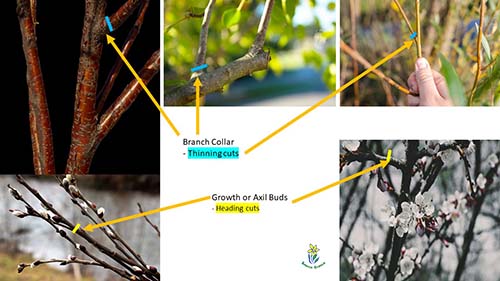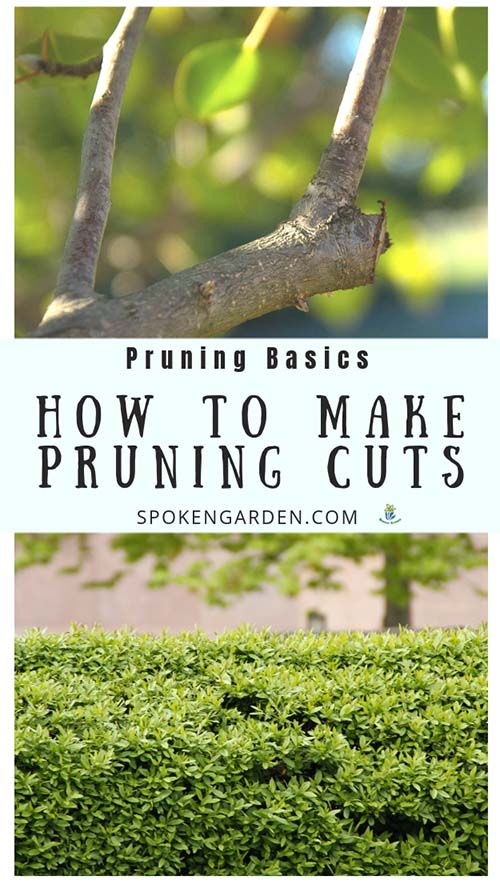Anyone can grab a pair of pruning shears and start cutting branches.
But without the proper training, how do you know that you’re not doing unnecessary damage to your plant?
In addition, where should you actually make your pruning cuts?
In our DIY Garden Minute Ep. 55 – “Pruning Basics: Where to Make Your Pruning Cuts,” we’ll tell you where you should make your pruning cuts.
This episode is meant for any level of gardener who wants to learn how to better prune and maintain their yard.
For our “Prune Like a Pro” free cheat sheet, click here!
Pruning Cuts
Two of the most important types of pruning cuts are thinning cuts and heading cuts.
Both types of cuts can have a huge impact on how your plant grow, along with specific plant physiology, genetics, and environmental factors.
Thinning Cuts
When you selectively cut single limbs or stems off a plant all the way back to its point of attachment, this is a “thinning” cut.
This doesn’t necessarily mean the whole limb; maybe just a section or branch of the larger limb.
Examples of this type of pruning are best for most trees, especially when creating “scaffolding” or branch structures.
Tools we recommend to make Thinning Cuts:
Corona ClassicCUT Forged Bypass Hand Pruner, cuts up to 1-inch
Fiskars 28 inch Bypass Loppers
Fiskars 7 inch Power Tooth Softgrip Folding Saw
Heading Cuts
When you selectively cut limbs or stems not at their point of attachment nor near other growth points, this is a “heading” cut.
This type of pruning is best for compact and dense growing plants which react well to shearing or hedging, other terms for “heading” cuts.
For more information on each type of cut, check out our previous podcast Pruning Basics: Thinning Cuts vs. Heading Cuts – DIY Garden Minute Ep. 51.
Tools we recommend to make Heading Cuts:
Corona ClassicCUT Forged Bypass Hand Pruner, cuts up to 1-inch
Fiskars Power Lever 9-inch Hedge Shears with Soft Grip Handle

Thinning and heading cuts are both examples of types of pruning cuts you need to learn.
Pruning Cuts Show Notes
Today’s topic: “Pruning Basics: Where to Make Your Pruning Cuts”
On this episode, learn where you should make your cuts and why.
Listen to learn about:
- A branch or stem collar – cut just above collar, so you don’t leave a stub.
- Growth or axil buds – cut about 1/2 inch above bud or “smiley-face”.
You can also learn more about pruning by listening to our DIY Garden Minute Ep. 10 about our 3-Pillars of Pruning.
And don’t forget to visit our Free Resources page to check out our plant profile sheets and printable freebies for mulching, pruning, and MORE!
Also be sure to read our Winter Pruning post or listen to our Fall Pruning Do’s and Don’ts podcast!
You can find other one-minute topics on our podcast page at spokengarden.com/podcast
On Instagram or Pinterest under @SpokenGarden (all one word) to follow or leave us a comment.
Find us on your favorite podcast platform and Alexa through MyPod or AnyPod!
And hey—before you head out—if you want to connect with us and subscribe to our newsletter go to Spoken Garden’s free resource page!
We have FREE garden content we are so excited to give to you, like cheat sheets, plant profile sheets, etc! See you there!
Thanks for Listening!!!
Share Your Thoughts:
- Leave a note in the comment section below.
- Leave comments/ suggestions at Seanandallison@eseospace.dev
- Share our show on Twitter, Facebook, or Pinterest.
To Help Out The Show:
- Leave a review on iTunes. Your ratings and reviews really help us out!
- Subscribe on iTunes or Spotify.
*Spoken Garden is a participant in the Amazon Services LLC Associates Program, an affiliate advertising program designed to provide a means for sites to earn advertising fees by advertising and linking to Amazon.com.
Subscribe on iTunes
Today’s Topic:
Pruning Cuts
Learn where to make your pruning cuts on your trees, shrubs, and plants!
Downloads:
“Prune Like a Pro” Pruning Cheat Sheet
What You’ll Learn:
- Where specifically to make your heading cuts and thinning cuts.
- Explanations of why to make cuts in each way.
Resources:
Some of the resources and products below may be affiliate links, meaning we might get paid a commission (at no extra cost to you) if you use that link to make a purchase.
- Pruning Basics Explained: Thinning Cuts vs. Heading Cuts – DIY Garden Minute Ep. 51
- Winter Pruning: How to Best Prune Your Garden This Winter
- 3 Pillars of Pruning: DIY Garden Minute Ep. 10
- Best Pruning Shears For Any Gardener!
- Understanding Basic Plant Growth – DIY Garden Minute Ep. 30
Other Gardening Products Related To This Podcast You Might Not Have:
- Best pruning shears
- Loppers
- Hand saw:
folding or fixed
- Blower
: hand-held or backpack, gas or electric
- Leaf Rake
: metal or plastic
- Hard Rake
: metal



